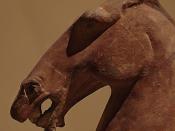Buddhism was first introduced in China during the first centuries A.D., during the time when the Han Dynasty was falling apart. Many people lost confidence in the native Confucian ideals and decided to turn to the new Buddhist principles. As Buddhism became popular gradually, it was also later under much influence by indigenous Chinese society and belief. The interaction between Buddhist and indigenous Chinese beliefs could be readily seen in some popular Chinese conceptions of the netherworld. The netherworld consists of retribution and rebirth, the five modes of existence, and the bureaucratic structure of the underworld.
The Chinese already had their ideas of retribution before Buddhism even came to China. The Chinese believed that good deeds led to reward, and evil deeds led to punishment. One's actions often determined the fate of his family and descendants as well. This idea was similar to the Buddhist concept of karma. Under Buddhist belief, deeds done in someone's present life determined the fate of his future lives.
As Buddhism spread, the idea of karma easily integrated with the indigenous conceptions of retribution. People even believed that someone could do good deeds, such as recite sutras, for the benefit of a family member who recently passed away. They all hoped that their family members may be reborn as respectable figures.
Associated with karma were modes of existence, or samsara. The individual's total deeds decides whether he or she can be reborn as an inhabitant of heaven, a human, an animal, a hungry ghost, or simply an inhabitant of hell. Being in heaven was similar to holding a high government position in Chinese society; only in ten thousand had this privilege. The path of a human was similar to the lower government officials. The animals and hungry ghosts are in comparison to commoners in society.


